 I used the term “captive audience” to describe Mix‘ target demographic last week. And funnily enough (or perhaps not) that was the phrase that kept running through my mind this week too. As a member of the Adachi cult it’s all good for me – my membership card is current and everything. But I can’t help but wonder what there is here for everyone else. Mix is a striking reminder of just how unusual Cross Game is in the Adachi catalogue – it goes about its business with much more urgency than usual, and launches with what may well be the most emotionally charged premiere episode in anime (it’s sure in the top 5).
I used the term “captive audience” to describe Mix‘ target demographic last week. And funnily enough (or perhaps not) that was the phrase that kept running through my mind this week too. As a member of the Adachi cult it’s all good for me – my membership card is current and everything. But I can’t help but wonder what there is here for everyone else. Mix is a striking reminder of just how unusual Cross Game is in the Adachi catalogue – it goes about its business with much more urgency than usual, and launches with what may well be the most emotionally charged premiere episode in anime (it’s sure in the top 5).
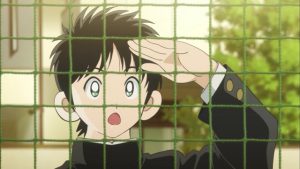 The truth is, Mix is much more the norm for Adachi than Cross Game. That was all well and good for anime in the heyday of his popularity (the 80’s and 90’s) but now? I’m not so sure. Even Touch was very deliberate in dramatic terms – though it was akin to seismic emotional tension building up and finally being released in a massive earthquake. And setting aside the question of a slow build (and Adachi’s plots can sometimes seem to move in geologic time), what does the average viewer think when they see stuff like Adachi showing up in Otomi’s dream to name the dog? Or the Touch theme song played by a school band, or characters almost referencing it by name?
The truth is, Mix is much more the norm for Adachi than Cross Game. That was all well and good for anime in the heyday of his popularity (the 80’s and 90’s) but now? I’m not so sure. Even Touch was very deliberate in dramatic terms – though it was akin to seismic emotional tension building up and finally being released in a massive earthquake. And setting aside the question of a slow build (and Adachi’s plots can sometimes seem to move in geologic time), what does the average viewer think when they see stuff like Adachi showing up in Otomi’s dream to name the dog? Or the Touch theme song played by a school band, or characters almost referencing it by name?
 It’s an interesting dilemma, though perhaps all the Touch in-jokes are going to go completely over the head of most of those viewers anyway. For me the self-referential (and usually self-deprecating) humor is an essential part of the Adachi mix (pun intended) – stuff like Natsuno (Kobayashi Daiki) talking about how he overheard the explanation for the Tachibana family dynamics. In case that wasn’t clear, Touma’s mother passed away, and Souichirou and Otomi’s father – and their surviving parents married when the boys were six, and she five.
It’s an interesting dilemma, though perhaps all the Touch in-jokes are going to go completely over the head of most of those viewers anyway. For me the self-referential (and usually self-deprecating) humor is an essential part of the Adachi mix (pun intended) – stuff like Natsuno (Kobayashi Daiki) talking about how he overheard the explanation for the Tachibana family dynamics. In case that wasn’t clear, Touma’s mother passed away, and Souichirou and Otomi’s father – and their surviving parents married when the boys were six, and she five.
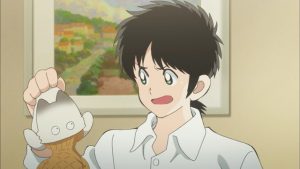 Even Touch readers/viewers were (and are) still piecing the puzzle together, so there’s no harm in my making note of a few interesting developments here. Like the photos of Tachibana-san in his Meisei uniform, which was #12 – but the kids found a #1 (ace) uni in the closet. Touma’s Occam’s Razor explanation is that his dad stole it, and Otomi doesn’t contradict him, so they agree not to ask about it (grrr). A lot of hay is made about the whole “Tou-chan” thing, too – the gag (as he is in most every respect, Adachi is shameless when it comes to puns) being that “Tou-chan” is also a name a child could use to refer to their father.
Even Touch readers/viewers were (and are) still piecing the puzzle together, so there’s no harm in my making note of a few interesting developments here. Like the photos of Tachibana-san in his Meisei uniform, which was #12 – but the kids found a #1 (ace) uni in the closet. Touma’s Occam’s Razor explanation is that his dad stole it, and Otomi doesn’t contradict him, so they agree not to ask about it (grrr). A lot of hay is made about the whole “Tou-chan” thing, too – the gag (as he is in most every respect, Adachi is shameless when it comes to puns) being that “Tou-chan” is also a name a child could use to refer to their father.
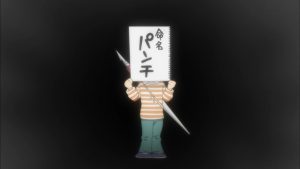 Amidst all this silliness is a really beautiful little sequence, the one in fact which pretty much made me fall in love with the story when I read it in the manga. The flashback to Otomi’s shyness around Touma when they were first brought together and how he tried to defuse it is very simple, very understated. But in Adachi’s hands it’s remarkably powerful, especially the way it resolves itself. He doesn’t have to oversell these moments, and that’s Adachi’s greatest gift – he can depict the emotional resonance of everyday life better than just about any mangaka I know.
Amidst all this silliness is a really beautiful little sequence, the one in fact which pretty much made me fall in love with the story when I read it in the manga. The flashback to Otomi’s shyness around Touma when they were first brought together and how he tried to defuse it is very simple, very understated. But in Adachi’s hands it’s remarkably powerful, especially the way it resolves itself. He doesn’t have to oversell these moments, and that’s Adachi’s greatest gift – he can depict the emotional resonance of everyday life better than just about any mangaka I know.
 What one can also take away from that vignette is the depth of the connection between Touma and Otomi, all the stronger for having taken a month to really engage. Sou’s role in all this is to be overprotective – he’s incensed that Tou leaves Otomi alone while he’s off on a double(header)-date. If you think Sou is being kind of a jerk here you’re not alone, I do too, but Tou does indeed go on home and in the process, chase off Otomi’s fan club (which is kind of creepy, as Adachi scenarios can sometimes be).
What one can also take away from that vignette is the depth of the connection between Touma and Otomi, all the stronger for having taken a month to really engage. Sou’s role in all this is to be overprotective – he’s incensed that Tou leaves Otomi alone while he’s off on a double(header)-date. If you think Sou is being kind of a jerk here you’re not alone, I do too, but Tou does indeed go on home and in the process, chase off Otomi’s fan club (which is kind of creepy, as Adachi scenarios can sometimes be).
 On the baseball front, we learn that “ace” Nikaidou’s father is an electricity magnate who’s a benefactor to the team and a former teammate of the coach, and Souichirou finally decides to abandon the subterfuge and just let Touma pitch in front of said coach after Nikadou leaves. This sort of injustice in the school club is as much a staple of an Adachi baseball story as the puns and same-face protagonists, though he always manages to give each incarnation of it a few interesting twists. And about the Kaji Yuuki thing, well – so far it’s not deal-breaking. Kaji is using his “dialed back” mode here, thank goodness – which tends to make him more of a neutral influence than a drag chute. As you can tell from the first two eps Touma is, like most Adachi heroes, a fairly composed guy, so hopefully things stay that way.
On the baseball front, we learn that “ace” Nikaidou’s father is an electricity magnate who’s a benefactor to the team and a former teammate of the coach, and Souichirou finally decides to abandon the subterfuge and just let Touma pitch in front of said coach after Nikadou leaves. This sort of injustice in the school club is as much a staple of an Adachi baseball story as the puns and same-face protagonists, though he always manages to give each incarnation of it a few interesting twists. And about the Kaji Yuuki thing, well – so far it’s not deal-breaking. Kaji is using his “dialed back” mode here, thank goodness – which tends to make him more of a neutral influence than a drag chute. As you can tell from the first two eps Touma is, like most Adachi heroes, a fairly composed guy, so hopefully things stay that way.




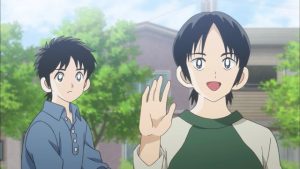
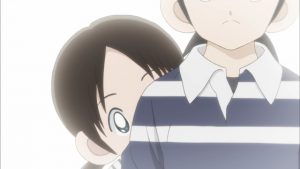
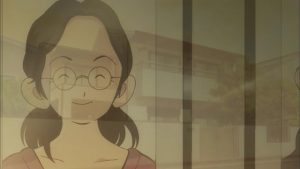



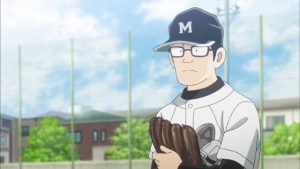

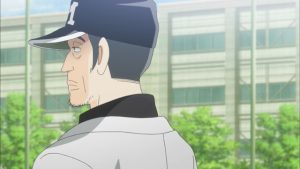

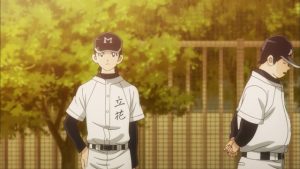
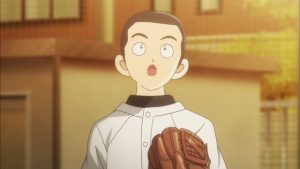

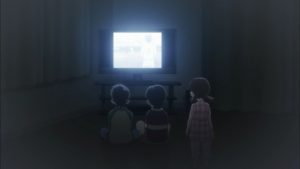







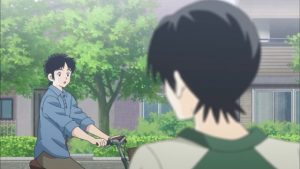
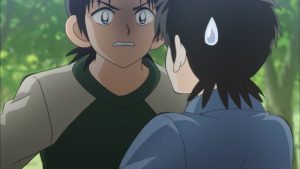

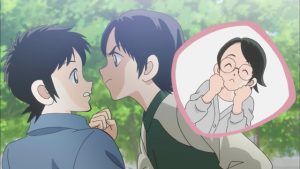


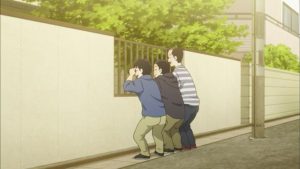

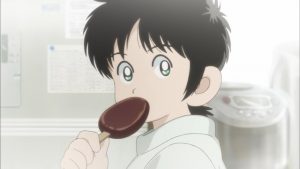
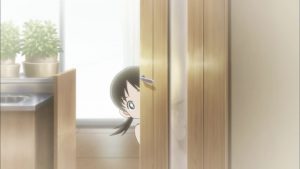





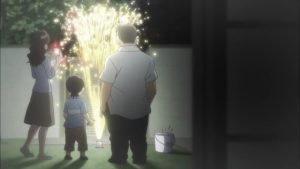
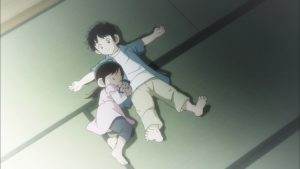
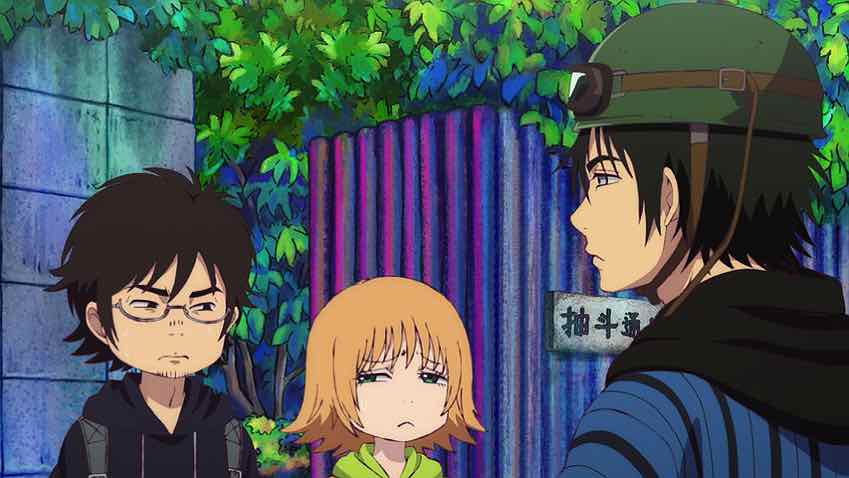
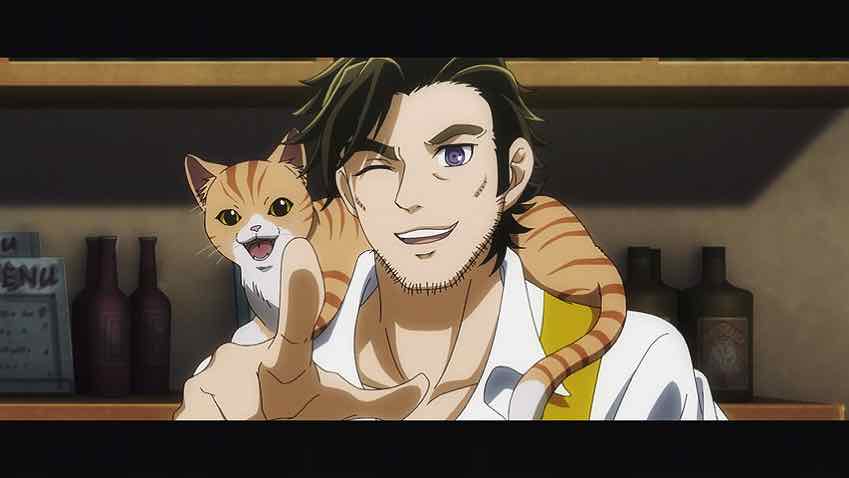
leongsh
April 14, 2019 at 5:24 amEven at this early stage, this series feels like a very comfy appropriately sized sweater. The adaptation has me snuggled up so well that it will tough to be objective in assessing this series. There’s many references to Touch but also the near constant 4th wall breaking poking fun at himself. Considering how often he does his terrible punnings and the fact there’s always him sneaking in mentions of rakugo, he has been telegraphing it as a rakugo fan but not to put us off. In-between all this catnip for Adachi fans, he builds up and drops in scenes of “show, don’t tell” that explain so much and with emotional resonance.
p.s. My membership card is a lifetime membership. Comes from having paid for by the purchases of various R2J dvd boxsets (e.g. Touch, Hiatari Ryoukou, H2) in addition to the tankoubans of his mamy manga titles.